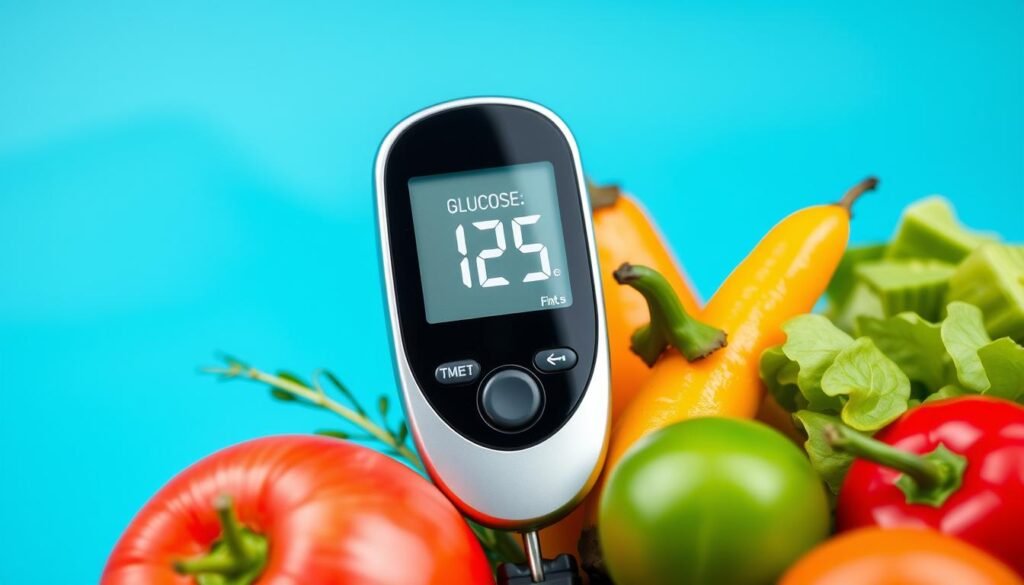Did you know that nearly 80% of diabetes cases are Type 2, often because of obesity? This fact shows how important it is to control our blood sugar for health. It’s vital not only for those with diabetes but for anyone wanting a healthier life.
In this guide, you’ll learn how managing diet, exercise, and medicine affects blood sugar. Getting your blood sugar right means feeling better overall. You’ll find out how to spot symptoms, check your levels, and get custom advice from doctors.
Want to manage your blood sugar with natural methods? Check out this link for tips on staying energetic and reducing tiredness through healthy living.
Key Takeaways
- Type 2 diabetes makes up about 80% of all diabetes, showing the need for good management.
- Regularly checking blood sugar can prevent serious diabetes problems.
- Lifestyle changes like eating right and exercising are key to controlling blood sugar.
- Doctors suggest ongoing health checks for the best diabetes management.
- Foods such as whole grains and protein help keep blood sugar stable.
- Keeping an A1C level under 7% lowers the risk of diabetes issues.
- Staying at a healthy weight boosts insulin sensitivity and blood sugar control.
Understanding Blood Sugar Levels
Blood sugar, or glucose, is crucial for energizing the body’s cells. It rises after we eat, due to the carbs and sugars ingested. Keeping blood sugar at healthy levels is key, especially for those with diabetes.
What is Blood Sugar?
Blood sugar levels show the glucose amount in our bloodstream. These levels change because of diet, activity, and meds. For people with diabetes, it’s important to monitor blood sugar. This helps them see how food and exercise affect them. Regular checks aid in creating a good management plan.
The Role of Insulin in Blood Sugar Control
Insulin helps manage blood sugar by letting glucose enter cells for energy. The pancreas makes insulin, and its levels vary with what we eat and our body’s needs. In Type 2 diabetes, the body might not use insulin well or make enough of it. Understanding insulin is crucial for managing diabetes well.
Types of Diabetes and Their Effects on Blood Sugar
Type 1 and Type 2 diabetes mainly differ in how they affect the body. In Type 1, the body can’t make insulin, so people need to take insulin for control. Type 2 is often due to insulin resistance, influencing sugar levels differently. Knowing these types helps in giving the right treatment. Managing diabetes well helps avoid complications for a better life.
| Type of Diabetes | Insulin Production | Blood Sugar Effects |
|---|---|---|
| Type 1 Diabetes | Little to none | High blood sugar levels without insulin |
| Type 2 Diabetes | Insufficient or ineffective | Increased risk of high blood sugar levels |
Blood Sugar Control through Diet
A well-planned diet is key in managing blood sugar levels. It focuses on a balanced diet to lessen glucose spikes. This improves your overall health. This method emphasizes whole foods, ensuring you get essential nutrients while keeping energy levels up.
Importance of a Balanced Diet
A balanced diet has carbs, proteins, and fats in suitable amounts. Eating whole grains, lean proteins, fruits, and veggies helps in managing sugar levels better. It’s important to watch portion sizes and meal timing to keep glucose stable all day.
Foods to Include and Avoid for Stable Levels
Incorporating high-fiber foods such as:
- Vegetables
- Fruits
- Whole grains
- Lean proteins
Makes controlling blood sugar easier. You should eat these foods for a well-rounded diet. However, knowing what foods to avoid is also key:
- Sugary drinks
- Processed foods
- Foods high in saturated fats
For more tips on diet and meal planning, check out this resource. Eating consistent carbs helps manage sugar levels, especially if you’re on diabetes meds. Understanding and using these dietary tips can lead to lasting health benefits.
Exercise Routine for Effective Management
Adding a regular exercise routine is key to controlling blood sugar levels. Exercise boosts insulin sensitivity and overall health. It helps not just to lower blood glucose but also aids in weight control. This is especially vital for those with diabetes.
Benefits of Regular Physical Activity
Regular exercise brings many benefits for diabetes management. It can reduce blood glucose for up to 24 hours post-workout. This is because it makes your body use insulin better, leading to improved blood sugar levels. Exercise also helps avoid weight gain and cuts down the risk of heart disease, which is crucial for diabetics.
Recommended Types of Exercises
To get the most out of exercising, mix aerobic and strength-training activities. Try to get at least 150 minutes of moderate aerobic exercise per week, like:
- Walking
- Swimming
- Cycling
Adding strength-training exercises 2 to 3 times weekly will also boost fitness and insulin sensitivity. This method improves health and blood sugar management.
Creating a Personalized Workout Plan
For the best exercise results, creating a plan that fits you is crucial. Work with healthcare professionals to build a routine that meets your needs and goals. This might include changes based on your fitness, diet needs, and diabetes care plans. Always check your blood sugar before and after exercise. This helps prevent low blood sugar levels and see if you need to adjust your medication or pre-exercise snack.
Monitoring Blood Sugar Levels
Managing diabetes well means keeping a close eye on your blood sugar levels. It’s important to know the best ways to check your glucose. This helps you stay in your target range. There are old and new methods for this.
Methods of Blood Sugar Monitoring
Blood glucose meters and continuous glucose monitors (CGMs) are common ways to check levels. Glucometers require a finger prick for each test. CGMs, however, provide constant glucose readings. They show glucose changes over time, which is great for those whose levels often change. Using a meter daily with a CGM ensures accurate diabetes management.
When and How Often to Check Blood Sugar
How often to check your blood sugar depends on your diabetes type and your treatment. People with type 1 diabetes usually test before meals and at bedtime, about four times a day. Some might need to test more, especially if they use insulin pumps or often have low blood sugar. Those with type 2 diabetes and on insulin or certain meds should also check often. For more info on monitoring, see the CDC’s blood sugar monitoring guidelines.

Understanding Diabetes Management: Medication and Lifestyle Changes
Managing diabetes effectively involves using medications and making lifestyle changes. These steps are key to keeping blood sugar levels right and avoiding complications. Learning about the types of drugs and the importance of sticking to them is essential. Also, knowing how changing your lifestyle can help is crucial for complete care.
Types of Diabetes Medications
There are many diabetes drugs available, all helping control blood sugar. Some common choices include:
- Insulin: Mainly for Type 1 diabetes but also some Type 2 cases, insulin reduces blood sugar quickly.
- SGLT2 inhibitors: These lower blood sugar and aid in weight loss but have risks like dehydration.
- GLP-1 receptor agonists: They’re good for managing weight and keeping blood sugar steady.
- Sulfonylureas: Drugs such as glipizide are popular for their lower hypoglycemia risk.
Importance of Medication Adherence
Sticking to your medication is a big deal in diabetes care. Research shows that 65 to 85 percent of people take their oral diabetes drugs as prescribed. But, insulin use is a bit less, at 60 to 80 percent. Skipping medication can lead to out-of-control blood sugar. This increases the risk of serious health issues. Taking medicine regularly keeps glucose levels in check, helping avoid heart disease and kidney problems.
Combining Medication with Lifestyle Modifications
Mixing medication with changes in your lifestyle offers a full-rounded management strategy. Important changes include:
- Dietary Adjustments: Cutting back on added sugars and unhealthy fats is vital for your health.
- Regular Exercise: Getting at least 150 minutes of exercise a week boosts insulin sensitivity and helps with weight.
- Weight Management: Losing 7% of your weight can drop your Type 2 diabetes risk significantly.
Together, medication and lifestyle changes form a strong plan for diabetes management. This combination helps people live better and healthier lives.
Identifying Symptoms of High and Low Blood Sugar
It’s very important to know the symptoms of high and low blood sugar. Recognizing these signs quickly helps avoid serious problems. High blood sugar symptoms are quite different from low blood sugar ones. Understanding these can help you stay healthier.
Recognizing Symptoms of Hyperglycemia
When your blood sugar is too high, you may notice certain signs. You might feel very thirsty or need to pee a lot. Feeling tired and having blurry vision are also common signs.
Knowing these symptoms helps you act fast to avoid worse issues. This includes dangers like coma or even death. If your blood sugar goes over 17.0 mmol/L, it can suddenly drop. This may cause low blood sugar symptoms.
Understanding Symptoms of Hypoglycemia
Low blood sugar, or hypoglycemia, shows different symptoms. You need to pay attention right away if you notice them. Feeling tired, anxious, weak, shaky, or sweaty are key signs to watch for.
If you have diabetes, these symptoms might start when your blood sugar goes below 70 mg/dL. Ignoring them can cause very serious issues. This includes unconsciousness or seizures. To treat mild low blood sugar quickly, eat something sweet like glucose tablets, fruit juice, or sugary drinks.

The Role of Weight Management in Blood Sugar Control
Weight management is key in controlling blood sugar levels. This is especially true for individuals with insulin sensitivity issues. Extra weight around the midsection causes insulin resistance, making it harder to regulate blood sugar. Learning how weight impacts insulin sensitivity is vital in creating effective weight management plans.
How Weight Affects Insulin Sensitivity
Studies show that obesity greatly increases the risk of type 2 diabetes. Obese men are seven times more at risk, while obese women are 12 times more likely to develop the condition than those who are a healthy weight. Losing 5% to 10% of body weight improves insulin sensitivity and blood sugar control, yielding significant health advantages for those with type 2 diabetes.
Strategies for Healthy Weight Loss
Achieving lasting weight loss requires lifestyle changes. This includes routine exercise and a well-balanced diet. Doing at least 150 minutes of moderate exercise or 75 minutes of high-intensity exercise each week helps. Also, spending under 15 minutes a day recording what you eat is impactful. It promotes responsibility and helps monitor progress. Here are some practical tips:
- Eat meals high in protein but low in carbs to manage hunger and lower insulin needs for those undergoing insulin therapy.
- Choose high-fiber, low-sugar carbs like beans and sweet potatoes over sugary snacks and beverages.
- Drink water rather than sweetened drinks to help keep blood sugar steady.
- Find support by connecting with others who are aiming to lose weight.
Weight loss success also depends on addressing emotional aspects that influence motivation. It’s important to stay positive and ready for any challenges. For substantial weight loss, considering options like weight loss surgery might be helpful. Always talk to a healthcare provider before starting new workout plans to make sure they fit your health needs.
For more information on how weight management impacts blood sugar control, check out this study.
Healthy Lifestyle Habits for Blood Sugar Management
Developing healthy habits is key to managing blood sugar well. This involves not just what you eat, but how active you are, how you handle stress, and how well you sleep. A good daily schedule helps keep your blood sugar steady and boosts your health.
Creating a Sustainable Routine
Having a regular daily schedule can help a lot if you’re managing blood sugar. It’s good to eat at the same times every day, have set times for exercise, and keep an eye on your blood sugar levels regularly. Here’s how to set up a routine that lasts:
- Set regular meal times to keep your blood sugar balanced all day.
- Do at least 150 minutes of moderate exercise like walking every week.
- Find activities that keep you physically and mentally fit.
- Have meals more often to prevent sudden high or low blood sugar.
The Effects of Sleep and Stress on Blood Sugar Levels
Sleep quality and dealing with stress are important for controlling blood sugar. Not sleeping well can mess with your metabolism and cause your blood sugar to rise. It’s essential to manage stress effectively. Keep these tips in mind:
- Aim for 7-9 hours of good sleep each night.
- Try relaxing activities like deep breathing or yoga.
- Understand that stress affects blood sugar. Look for ways to lessen it.

To care for your blood sugar well, you must commit to a healthy lifestyle. By sticking to a good routine and knowing how sleep and stress impact you, you can improve your health.
Blood Sugar Control: Medication and Lifestyle Changes
Managing blood sugar requires a mix of medication and lifestyle changes. It’s important for people with diabetes to adjust both. Working closely with doctors and nurses helps. They ensure treatments and lifestyle changes work together to improve health.
Integrating Lifestyle Changes with Medical Treatments
Medication is key to maintain blood sugar levels. But so are diet and exercise. Guidelines now suggest pairing drugs like Metformin with good food choices and regular activity. For those with Type 2 diabetes, treatments may include insulin or new drugs. Drugs like GLP-1 receptor agonists and SGLT2 inhibitors work well with lifestyle adjustments. They not only help manage blood sugar but also protect the heart and kidneys.
Collaboration with Healthcare Professionals
Working with healthcare experts is vital for diabetes care. Regularly meeting with doctors and dietitians helps tweak treatments. This team effort allows for care tailored to personal health and preferences. Following advice from dietitians can create lasting habits. These habits, supported by medication, lead to better blood sugar control.
Conclusion
Managing blood sugar is crucial for people with diabetes. This is especially true since over 34 million in the U.S. suffer from Type 2 diabetes. A mix of diet, exercise, and sticking to meds is vital. By eating lots of fruits, veggies, and whole grains, and keeping an eye on calories, you can avoid severe problems. Diseases related to diabetes, like heart issues, can be reduced this way.
Staying active is equally important. Just 150 minutes of exercises like walking each week can boost insulin use and control blood sugar. Making these changes helps people spot and deal with blood sugar highs and lows early on.
In short, following these tips can make a big difference in your health and happiness. It also helps keep blood sugar at a good level. Working with healthcare experts and tweaking your method helps keep you on track for a healthy life.